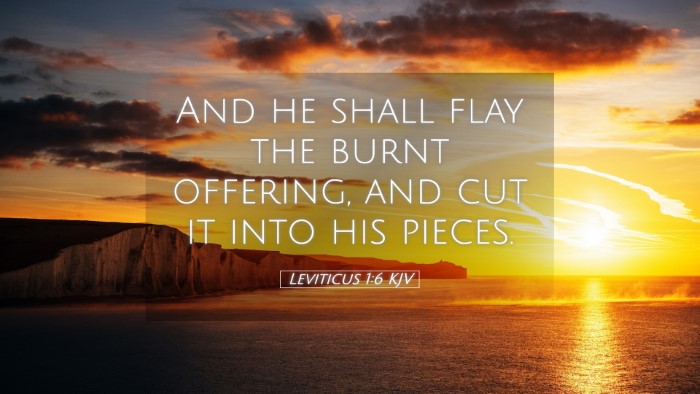Commentary on Leviticus 1:6
Verse Text: "And he shall flay the burnt offering, and cut it into his pieces."
Introduction
Leviticus 1:6 is a pivotal verse within the sacrificial system outlined in the Book of Leviticus, where God provides guidelines for the offerings made to Him. This verse details the procedure for preparing the burnt offering, highlighting the significance of each action taken by the priest and the offerer.
Exegesis of the Verse
In this verse, the phrase "he shall flay the burnt offering" indicates the methodical approach required in the sacrificial process. The act of flaying symbolizes the complete surrender of oneself to God, reflecting the idea that nothing less than total dedication is acceptable in worship. Here, Albert Barnes notes that this process was essential for the priest to ensure the offering met the divine standard set forth in the law.
Divine Order and Holiness
Matthew Henry emphasizes the importance of divine order in this procedure. Each step taken during the offering signifies the holiness of God and the serious nature of sin. The act of preparing the animal points to the need for atonement and reconciliation between God and humanity. The burnt offering, in particular, serves as a complete surrender to God, symbolizing that all aspects of life are to be dedicated to Him.
The Symbolism of the Cutting Process
The instruction to "cut it into his pieces" reveals additional layers of meaning. Adam Clarke asserts that cutting the animal into pieces signifies the separation of the offerer from their sin. This separation indicates a recognition of the seriousness of sin and the cost of redemption. Each piece represents different aspects of the offering with symbolic significance, highlighting the necessity of atoning for various transgressions.
The Role of the Priest
The priest plays a crucial role in this sacrificial ritual. According to Matthew Henry, the priest's involvement is not merely clerical; it is deeply spiritual. The priest mediates between God and the people, facilitating the worshiper's transaction with God. This role underscores the belief in a divinely ordained intermediary, foreshadowing the ultimate sacrifice of Christ, who serves as the great High Priest.
Theological Implications
Understanding the theological implications of Leviticus 1:6 is essential for pastors and scholars alike. The burnt offering represents not only atonement but also total commitment to God. Albert Barnes points out that this offering is a precursor to understanding Christ's sacrificial death, where Jesus offered Himself completely for the sins of humanity.
Gratitude and Worship
The act of offering a burnt sacrifice encompasses an element of gratitude. Worshippers present their offerings as a response to God's mercy and grace. This illustrates an essential aspect of worship: a heart of thanksgiving. Matthew Henry notes that true worship comes from recognizing God’s goodness and responding with our best.
Practical Applications
For contemporary believers, Leviticus 1:6 offers vital lessons in how they approach worship and sacrifice. While the ritualistic elements may not be directly applied today, the underlying principles remain relevant.
- Commitment: Every believer is called to a life of sacrificial commitment. This verse encourages personal reflection on what it means to provide oneself fully to God.
- Holiness: The meticulous process reminds us of God's holiness and our need for purity in our relationship with Him.
- Thanksgiving: Approaching God with gratitude is fundamental to true worship.
- Understanding Atonement: Recognizing the significance of atonement helps inform our relationship with God and points us to Christ's ultimate sacrifice.
Conclusion
In summary, Leviticus 1:6 serves as a significant reference for understanding the nature of sacrifice and worship in the Old Testament. By studying this passage, we grasp the seriousness of sin, the holiness of God, and the profound implications of what it means to offer ourselves as living sacrifices. Commentaries by Albert Barnes, Matthew Henry, and Adam Clarke enrich our understanding and invite us to delve deeper into the practices of faith that lead to greater devotion and commitment to God.


